Brake lines are an essential part of any vehicle’s brake system, as they are responsible for carrying brake fluid from the master cylinder to the brake calipers.
Over time, however, brake lines can become damaged or weakened, leading to failure. This article will explore some common causes of brake line failure and discuss how to prevent it. Brake lines can break for a number of reasons.
Some common causes of brake line failure include corrosion, damage from road debris, and manufacturing defects. Brake lines can sometimes become weak and brittle over time, making them more susceptible to breaking. In other cases, the brake lines may be damaged by impact from rocks or other debris on the road.
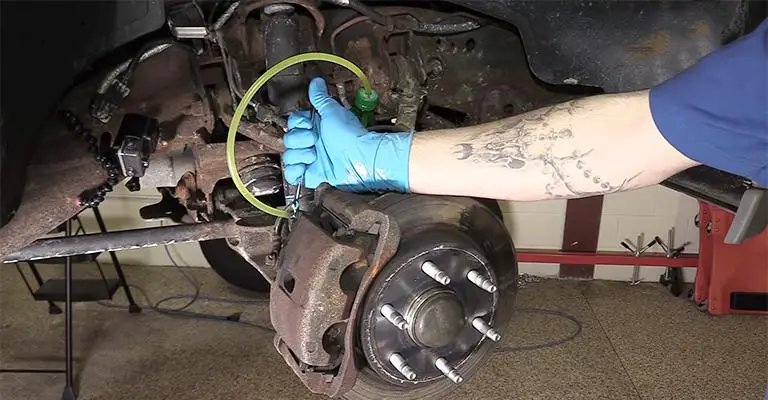
Contents
- 1 How To Identify Problems With Brake Lines?
- 1.1 1. Brake Lines Are Damaged
- 1.2 2. There Is A Leak In The Brake Fluid
- 1.3 3. There Is A Brake Light On
- 1.4 4. Braking Power Has Been Reduced
- 1.5 What Happens If Your Brake Lines Are Damaged?
- 1.6 Identifying The Causes Of Brake Line Failure
- 1.7 Causes of Damage to Steel Brake Lines
- 1.8 Rubber Brake Lines Can Be Damaged By Several Factors
- 1.9 What To Do If Your Brake Line Fails While Driving?
- 1.10 How Many Brake Hoses Does A Car Have?
- 1.11 Brake Line Replacement Cost
- 2 Final Words
How To Identify Problems With Brake Lines?
The brake lines on your car are designed to last as long as the car itself, but that isn’t always the case. A failing brake system usually exhibits the following warning signs:
1. Brake Lines Are Damaged
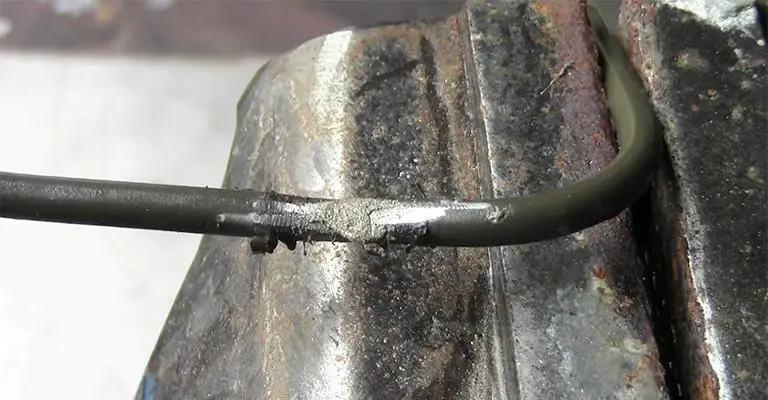
When your brake lines are damaged by corrosion or cracks, you know it’s time for a replacement. Rusted brake lines can easily develop in cars that have been parked for an extended period without being driven.
Cars driven in snowy environments with rock salt used to thaw icy roads are also more susceptible to rusting brake lines.
2. There Is A Leak In The Brake Fluid
If you see brake fluid on the ground, you have a brake fluid leak. Brake fluid is typically yellow when new, but it can turn brown over time as it breaks down.
If you regularly check the brake fluid level in your brake tubing, you may be able to detect a potential leak.
3. There Is A Brake Light On
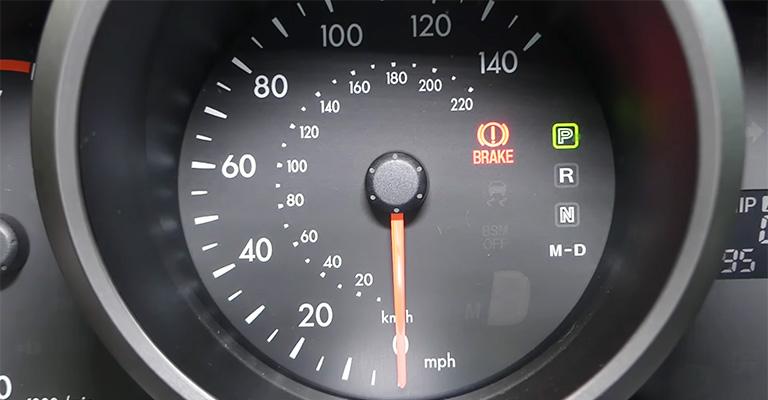
One of two things can cause a brake warning light to illuminate. There is insufficient brake fluid in the master cylinder, or (especially on older vehicles) the parking brake is engaged. A low brake fluid level, or a damaged brake line, is usually the culprit.
4. Braking Power Has Been Reduced
If your brakes suddenly stop working or you have trouble stopping your car, you may have brake line failure.
It may also result from worn brake pads or hydraulic problems like a faulty master cylinder. To determine the cause of your car’s problems, always take it to a professional.
What Happens If Your Brake Lines Are Damaged?
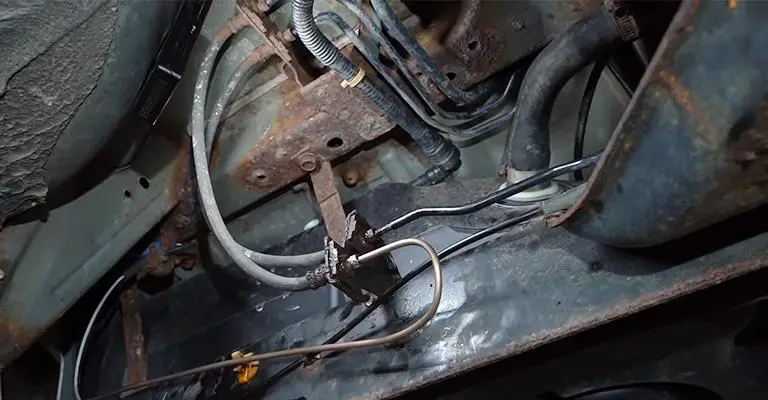
Brake failure can occur for a variety of reasons – and a broken brake line is one of them. Damaged brake lines prevent brake fluid from reaching the tire’s braking mechanism, preventing hydraulics from working.
In most brake systems, two separate circuits prevent complete failure of the brakes – creating a split system. It is possible to have either of the following circuits:
Front/rear: Front brakes are controlled by one set of brake lines, while the other set controls rear brakes.
Diagonal: There are two sets of brake lines, one controlling the right-front and left-rear brakes, the other controlling the right-front and right-rear brakes.
You will still have another brake line in case one blows. In the case of a front-rear brake line failure, braking will jump the back of your car, causing you to skid, causing the back of the car to jump.
The front brakes of your car should still work, so you should be able to stop the car. You will lose all brake function if both brake lines fail.
Identifying The Causes Of Brake Line Failure
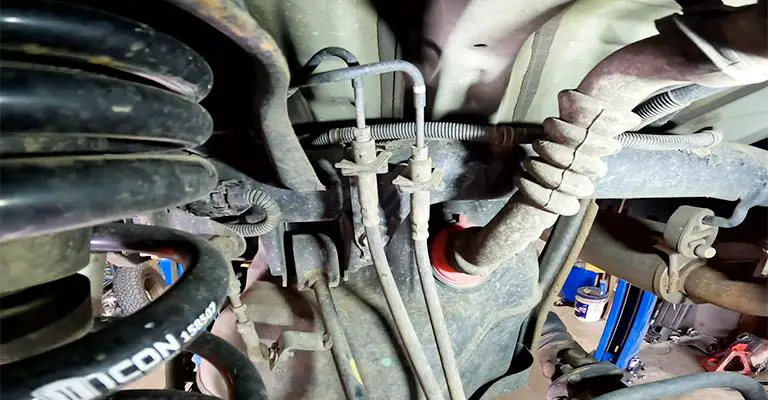
Brake fluid is forced through brake lines and into braking units on each wheel when you press down on the brake pedal. Brake pads are pressed against brake rotors by the fluid, slowing them down.
As a result of the requirement for flexibility, the brake lines on the front and back wheels are made of rubber; otherwise, they are made of steel.
Steel brake lines are typically used to stop your car, but they’re also susceptible to environmental deterioration. There are two reasons why brake lines break:
- Corrosion caused by road salt
- Corrosion of steel caused by moisture getting into it
Corroded or damaged brake lines can let moisture into your braking system, causing it to stop working properly or even fail. You can prevent major problems from occurring by routinely checking your brake lines.
Causes of Damage to Steel Brake Lines
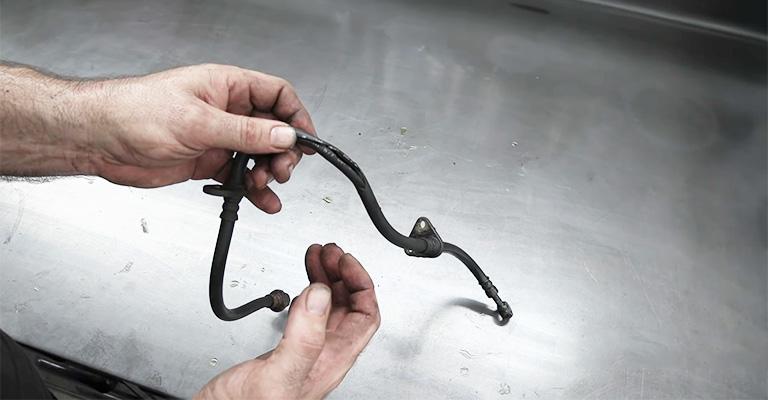
Rust and breakage are inevitable in the steel brake lines of a vehicle. This process can be accelerated by road salt.
Steel brake lines can also be bent or collapsed due to impact, which weakens and renders them vulnerable to failure.
The best course of action is to replace the whole brake line if a steel brake line breaks rather than patching it up.
Rubber Brake Lines Can Be Damaged By Several Factors
Moisture and heat naturally deteriorate rubber brake lines over time. During the winter, salt that is spread on icy roads can corrode them as well.
During the winter, if the roads where you live are covered in salt, you should regularly wash your car’s underbody to remove the salt and prevent brake line damage.
What To Do If Your Brake Line Fails While Driving?
Avoid panicking if your brake lines fail while you’re driving. Your brake lines come in two sets. It should still work with one set. What you need to do is:
1. Pump The Brakes
You can increase braking action by pumping the brake pedal to build up pressure in the brake lines.
Even if you don’t get full braking capacity back, you can still control the car and stop safely with just enough braking power. The ABS pump works in a similar way to help prevent skidding.
2. Pull Over
Do not drive if there is a leak in the brake line, no matter how small. It is impossible to stop safely in traffic if you have faulty brakes. Towing your car should be your first priority.
3. Unless You Are Driving Very Slowly, Don’t Pull The Parking Brake
Vehicles that are moving cannot be stopped with parking brakes. Their purpose is to prevent your vehicle from rolling when it is stationary.
You can damage your brake system at high speeds if you pull the parking brake. Parking brakes should only be used if you are traveling at a very slow speed.
How Many Brake Hoses Does A Car Have?
There are four brake hoses on the average car. If you were expecting a much lower bill, your mechanic should have explained things more clearly. It is common to replace brake lines in pairs.
Brake Line Replacement Cost
There is an average cost of $30-50 for brake line parts. Replacement of brake lines can cost $150-$200 on average, including labor. The actual costs, however, will vary based on the following:
- The shop’s labor rates
- The number of brake lines that need to be replaced
- It may be more expensive to repair older vehicles with hard-to-find parts
- A vehicle’s make dictates the cost of replacement parts, with an expensive model generally costing more
Final Words
A mechanic with experience is recommended for replacing brake lines, even if you can do it yourself. You shouldn’t cut corners when it comes to brakes because they are crucial to vehicle safety.
You can’t make a mistake if you need to repair brake lines. It is possible to cause more damage to your vehicle and, more importantly, cause a serious accident on the road due to a mistake. Hence, it’s always safer to rely on the expertise of a professional.
